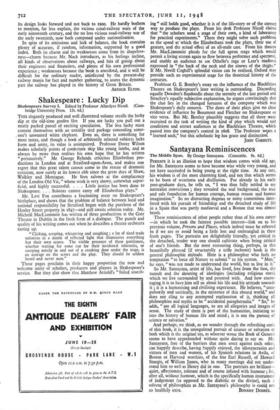Shakespeare : Lucky Dip
Shakespeare Survey I. Edited by Professor Allardyce Nicoll. (Cam- bridge University Press. 12s. 6d.) Tuts elegantly produced and well illustrated volume recalls the lucky dip at the old-time garden fête. If you are lucky you pull out a neatly packed parcel of exciting speculation. The less lucky must content themselves with an untidily tied package concealing some- , one's unwanted white elephant. Even so, there is something for most tastes, and though a book of arbitrarily selected subjects lacks form and unity, its value is unimpaired. Professor Dover Wilson makes scholarly points of conjecture skip like young lambs, and as always he more than realises his own hope that he has written " persuasively." Mr George Rylands criticises Elizabethan pro- ductions in London and at Stratford-upon-Avon, and makes one regret that this great talent cannot come to the rescue Of dramatic criticism, now surely at its lowest ebb since the great days of Shaw, Walkley and Montague. He fires salvoes at the complacency of the London Old Vic, " whose work is very showy, somewhat super- ficial, and highly successful. . . . Little justice has been done to Shakespeare. . . . Soloists cannot carry off Elizabethan plays."
Mr. Levi Fox contributes a fascinating essay on Shakespeare's birthplace, and shows that the problem of balance between local and national responsibility for Stratford began with the purchase of the Henley Street property in 1847—and still awaits solution today. Mr. Micheal MacLiammoir has written of three productions at the Gate Theatre in Dublin in the fresh form of a dialogue. The punch and quality of his writing comes out when he describes a theatre orchestra tuning up.
" Clicking, scraping, whispering and coughing ; a lot of tired trade unionists in a dazzle of reflected light that illuminates everything but their own scores. The visible presence of these gentlemen, whether waiting for some cue for their incidental infernalia, or creeping noisily in and out of a creaking door under the stage, is an outrage on the actors and the play. They should be seldom heard and never seen."
These pages proclaim in their happy proportion the new and welcome unity of scholars, producers and players in Shakespeare's service. But they also show that Matthew Arnold's " foiled search-
ing " still holds good, whether it is of the life-story or of the correct way to produce the plays. From his desk Professor Nicoll claims that " the scholars need a stage of their own, a kind of laboratory for practical experiments." There they might solve such problems as the speed at which the Elizabethans took the plays, their use of gesture, and the actual effect of an all-male cast. From his theatre Mr. MacLiarnmoir pleads for the full apron stage which would permit a living stream again to flow between performer and spectator, and enable an audience to see Othello's rage or Lear's madness expressed in " the back of the neck and the sinews of the thighs." If Mr. Nevill Coghill's splendid vision can be realised, Oxford may provide such an experimental stage for the theatrical history of the centuries.
ProfeSsor G. E. Bentley's essay on the influence of the Blackfriars Theatre on Shakespeare's later writing is outstanding. Discarding equally Dowden's flapdoodle about the serenity of the last period and Strachey's equally subjective explanation, he argues convincingly that the clue lies in the changed fortunes of the company which was Shakespeare's daily concern. The dates of their plays give no clear evidence of influence by Beaumont and Fletcher on Shakespeare or vice versa. But Mr. Bentley plausibly suggests that all three were recruited to the task of writing the kind of play which would suit conditions and attract audiences at the Blackfriars Theatre, which passed into the company's control in 1608. The Professor wears a "learned sock," but this scholastic leg has grace and distinction.
Joint GARRETT.






























 Previous page
Previous page